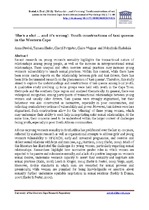'She's a slut ... And it's wrong': Youth constructions of taxi queens in the Western Cape

View/
Date
2013Author
Strebel, Anna
Shefer, Tamara
Potgieter, Cheryl
Wagner, Claire
Shabalala, Nokuthula
Metadata
Show full item recordAbstract
Recent research on young women’s sexuality highlights the transactional nature of relationships among young people, as well as the increase in intergenerational sexual relationships. These unequal and often coercive sexual practices may increase young women’s vulnerability to unsafe sexual practices. Within this context, while there have been some media reports on the relationship between girls and taxi drivers, there has been little documented research on the phenomenon of ‘taxi queens’. Therefore, this study aimed to explore the understandings and constructions of taxi queens among local youth. A qualitative study involving 13 focus groups were held with youth in the Cape Town Metropole and the southern Cape region and analysed thematically. In general, there was widespread recognition among participants of transactional relationships between young women and usually older drivers. Taxi queens were strongly stigmatised, but their behaviour was also constructed as normative, especially in poor communities, and reflecting contradictory notions of vulnerability and power. However, taxi drivers were less stigmatised. Such constructions allow for the ‘othering’ of these young women, which may undermine their ability to seek help in negotiating safer sexual relationships. At the same time, their concerns need to be understood within the larger context of challenges facing youth, especially in poor South African communities.
